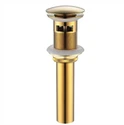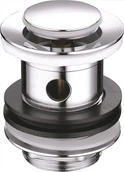What is the hardness of a cup washer?
As a dedicated supplier of cup washers, I often encounter inquiries about the hardness of these essential components. The hardness of a cup washer is a crucial factor that determines its performance, durability, and suitability for various applications. In this blog post, I will delve into the concept of hardness in cup washers, exploring its significance, measurement methods, and how it impacts the functionality of these products.
Understanding Hardness in Cup Washers
Hardness refers to the ability of a material to resist deformation, indentation, or scratching. In the context of cup washers, hardness plays a vital role in ensuring that the washer can withstand the forces and pressures it is subjected to during use. A cup washer with the appropriate hardness will maintain its shape and integrity, providing a reliable seal and preventing leaks.
The hardness of a cup washer is influenced by several factors, including the material from which it is made, the manufacturing process, and any heat treatment or surface finishing applied. Different materials have varying levels of hardness, and the choice of material depends on the specific requirements of the application.
Common Materials and Their Hardness
Rubber
Rubber is a popular material for cup washers due to its flexibility, resilience, and excellent sealing properties. The hardness of rubber cup washers is typically measured on the Shore durometer scale, which ranges from 0 to 100. A lower Shore hardness value indicates a softer rubber, while a higher value indicates a harder rubber.
Soft rubber cup washers (Shore hardness of 30 - 50) are often used in applications where a tight seal is required, such as in plumbing fixtures or hydraulic systems. These washers can conform to irregular surfaces and provide a reliable seal even under low pressure.
Harder rubber cup washers (Shore hardness of 60 - 90) are more suitable for applications where greater resistance to wear and tear is needed. They are commonly used in industrial machinery, automotive components, and high-pressure systems.
Plastic
Plastic cup washers are lightweight, corrosion-resistant, and cost-effective. The hardness of plastic cup washers can vary depending on the type of plastic used. For example, polypropylene (PP) is a relatively soft plastic with a hardness of around 70 - 80 on the Rockwell hardness scale, while acetal (POM) is a harder plastic with a hardness of around 90 - 100 on the same scale.
Plastic cup washers are often used in applications where chemical resistance and electrical insulation are important, such as in electrical appliances, electronic devices, and food processing equipment.
Metal
Metal cup washers are known for their strength, durability, and high-temperature resistance. The hardness of metal cup washers is typically measured on the Brinell, Rockwell, or Vickers hardness scales.
Steel cup washers are commonly used in heavy-duty applications, such as in construction, automotive, and machinery industries. The hardness of steel cup washers can range from 150 to 600 on the Brinell hardness scale, depending on the type of steel and the heat treatment process.
Copper and brass cup washers are also popular due to their excellent corrosion resistance and electrical conductivity. The hardness of copper and brass cup washers is generally lower than that of steel, ranging from 50 to 200 on the Brinell hardness scale.
Measuring the Hardness of Cup Washers
There are several methods for measuring the hardness of cup washers, each with its own advantages and limitations. The choice of measurement method depends on the material of the washer, the size and shape of the washer, and the required level of accuracy.
Shore Durometer
The Shore durometer is a widely used method for measuring the hardness of rubber and other elastomeric materials. It involves pressing a pointed indenter into the surface of the material and measuring the depth of penetration. The hardness value is then read from a scale on the durometer.
The Shore durometer is a quick and easy method for measuring the hardness of rubber cup washers, but it may not be suitable for measuring the hardness of very hard or very thin materials.
Rockwell Hardness Test
The Rockwell hardness test is a common method for measuring the hardness of metals and some plastics. It involves pressing a hardened steel ball or a diamond cone into the surface of the material under a specified load and measuring the depth of penetration. The hardness value is then read from a scale on the Rockwell hardness tester.
The Rockwell hardness test is a more accurate and reliable method for measuring the hardness of metal cup washers than the Shore durometer, but it requires specialized equipment and trained operators.
Brinell Hardness Test
The Brinell hardness test is another method for measuring the hardness of metals. It involves pressing a hardened steel ball into the surface of the material under a specified load and measuring the diameter of the indentation. The hardness value is then calculated using a formula based on the load and the diameter of the indentation.
The Brinell hardness test is a more accurate and reliable method for measuring the hardness of large or thick metal cup washers than the Rockwell hardness test, but it is also more time-consuming and requires specialized equipment.
Impact of Hardness on Cup Washer Performance
The hardness of a cup washer has a significant impact on its performance in various applications. Here are some key ways in which hardness affects the functionality of cup washers:
Sealing Performance
The hardness of a cup washer determines its ability to form a tight seal against the mating surface. A softer washer can conform to irregularities in the surface and provide a better seal, but it may also be more prone to deformation and leakage under high pressure. A harder washer, on the other hand, can withstand higher pressures without deforming, but it may not conform as well to irregular surfaces and may require a more precise mating surface to achieve a good seal.
Wear Resistance
The hardness of a cup washer also affects its resistance to wear and tear. A harder washer is more resistant to abrasion, cutting, and scratching, which can extend its service life and reduce the need for frequent replacement. However, a very hard washer may also be more brittle and prone to cracking or breaking under certain conditions.
Chemical Resistance
The hardness of a cup washer can also influence its chemical resistance. Some materials, such as rubber and plastic, may be more resistant to certain chemicals when they are harder. For example, a harder rubber washer may be more resistant to oil and fuel than a softer rubber washer. However, the chemical resistance of a washer also depends on the specific chemical environment and the type of material used.
Applications of Cup Washers with Different Hardness
Cup washers with different hardness levels are used in a wide range of applications across various industries. Here are some examples:
Plumbing
In plumbing applications, cup washers are used to seal joints between pipes, faucets, and other fixtures. Soft rubber cup washers are commonly used in low-pressure applications, such as in household plumbing, to provide a tight seal and prevent leaks. Harder rubber or plastic cup washers may be used in high-pressure applications, such as in commercial plumbing systems or industrial pipelines.
Automotive
In the automotive industry, cup washers are used in various components, such as engines, transmissions, brakes, and fuel systems. Metal cup washers are often used in high-temperature and high-pressure applications, such as in engine cylinder heads and exhaust systems, to provide a reliable seal and prevent leaks. Rubber or plastic cup washers may be used in other applications, such as in door seals, window seals, and electrical connectors.
Industrial Machinery
In industrial machinery, cup washers are used in a variety of applications, such as in pumps, valves, compressors, and hydraulic systems. The hardness of the cup washer depends on the specific requirements of the application, such as the pressure, temperature, and chemical environment. Harder metal or plastic cup washers are often used in high-pressure and high-temperature applications, while softer rubber cup washers may be used in applications where a tight seal is required.
Food and Beverage Industry
In the food and beverage industry, cup washers are used in equipment such as pumps, valves, and tanks to ensure a hygienic and leak-free operation. Plastic cup washers are commonly used in this industry due to their corrosion resistance, chemical resistance, and ease of cleaning. The hardness of the plastic cup washer depends on the specific requirements of the application, such as the type of food or beverage being processed and the cleaning agents used.
Conclusion
The hardness of a cup washer is a critical factor that determines its performance, durability, and suitability for various applications. As a cup washer supplier, I understand the importance of providing high-quality products with the appropriate hardness for each customer's specific needs.
Whether you are looking for a soft rubber cup washer for a low-pressure plumbing application or a hard metal cup washer for a high-temperature industrial machinery application, I can offer a wide range of cup washers to meet your requirements. Our cup washers are made from high-quality materials and are manufactured using advanced processes to ensure consistent hardness and performance.
If you are interested in learning more about our cup washers or would like to discuss your specific application requirements, please feel free to contact us. We are always happy to provide technical support and assistance to help you select the right cup washer for your needs.
References
-
ASTM International. (2023). Standard Test Methods for Rubber Property - Durometer Hardness. ASTM D2240 - 22.


-
ASTM International. (2023). Standard Test Methods for Rockwell Hardness and Rockwell Superficial Hardness of Metallic Materials. ASTM E18 - 23a.
-
ASTM International. (2023). Standard Test Method for Brinell Hardness of Metallic Materials. ASTM E10 - 22e1.
-
Link to Bar Sink With Glass Rinser
-
Link to Kitchen Glass Rinser
-
Link to Cup Rinser in Sink
If you're in the market for high - quality cup washers and wish to discuss your procurement needs, feel free to reach out. We're eager to engage in productive discussions and provide the best solutions for your requirements.






